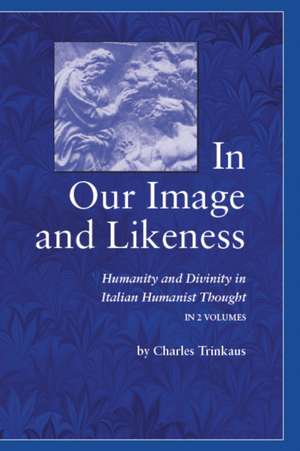In Our Image and Likeness – Humanity and Divinity in Italian Humanist Thought
Autor Charles Trinkausen Limba Engleză Hardback – 14 mar 2017
| Toate formatele și edițiile | Preț | Express |
|---|---|---|
| Paperback (1) | 406.57 lei 6-8 săpt. | |
| MR – University of Notre Dame Press – 30 sep 1995 | 406.57 lei 6-8 săpt. | |
| Hardback (1) | 858.57 lei 6-8 săpt. | |
| MR – University of Notre Dame Press – 14 mar 2017 | 858.57 lei 6-8 săpt. |
Preț: 858.57 lei
Preț vechi: 1176.14 lei
-27% Nou
Puncte Express: 1288
Preț estimativ în valută:
164.31€ • 170.09$ • 138.88£
164.31€ • 170.09$ • 138.88£
Carte tipărită la comandă
Livrare economică 05-19 martie
Preluare comenzi: 021 569.72.76
Specificații
ISBN-13: 9780268189501
ISBN-10: 0268189501
Pagini: 1024
Dimensiuni: 152 x 229 x 52 mm
Greutate: 1.51 kg
Editura: MR – University of Notre Dame Press
ISBN-10: 0268189501
Pagini: 1024
Dimensiuni: 152 x 229 x 52 mm
Greutate: 1.51 kg
Editura: MR – University of Notre Dame Press
Notă biografică
Recenzii
"In this massive, meticulously researched work Trinkaus makes a major contribution to our understanding of the Italian humanists and the Christian Renaissance in Italy. . . . The author argues persuasively that the Italian humanists drew their inspiration more from the church fathers than from the pagan ancients. . . . [This is] the most comprehensive and most important study of Italian humanism to appear in English. It is a mine of information, offering, among other things, detailed analyses of texts which have been ignored even by Italian scholars." —Library Journal
"A substantial contribution to the continuing debate on the meaning and significance, even the very existence, of the Renaissance. . . . [T]his study . . . present[s] an original, challenging interpretation of Renaissance thought, stemming from Trinkaus's complete command of Classical, Patristic, Scholastic, and Renaissance sources, and his familiarity with modern scholarly literature." —Choice
"Histories of spirituality have given scant attention to lay spirituality and lay theologizing in centuries previous to the twentieth. Trinkaus provides much material toward redressing the balance as regards Renaissance Italy." —Review for Religious
“. . . an important and thoughtful book. It is . . . a book to return to again and again.” —Times Literary Supplement
Descriere
Descriere de la o altă ediție sau format:
This two-volume set provides an analysis of early Italian humanist thought and the Christian Renaissance. The author argues that the Italian humanists drew their inspiration more from the Church fathers than from the pagan ancients.
This two-volume set provides an analysis of early Italian humanist thought and the Christian Renaissance. The author argues that the Italian humanists drew their inspiration more from the Church fathers than from the pagan ancients.
